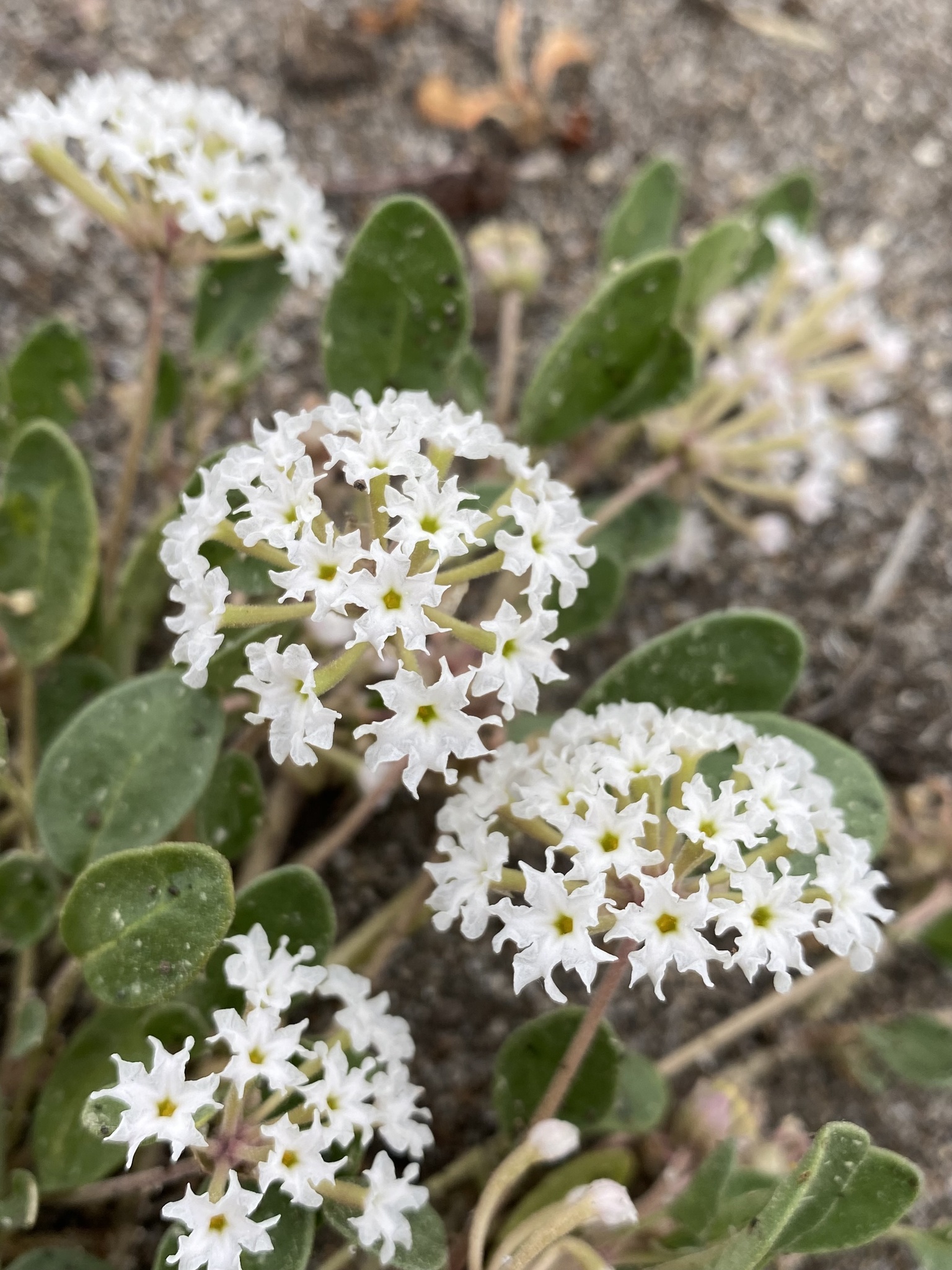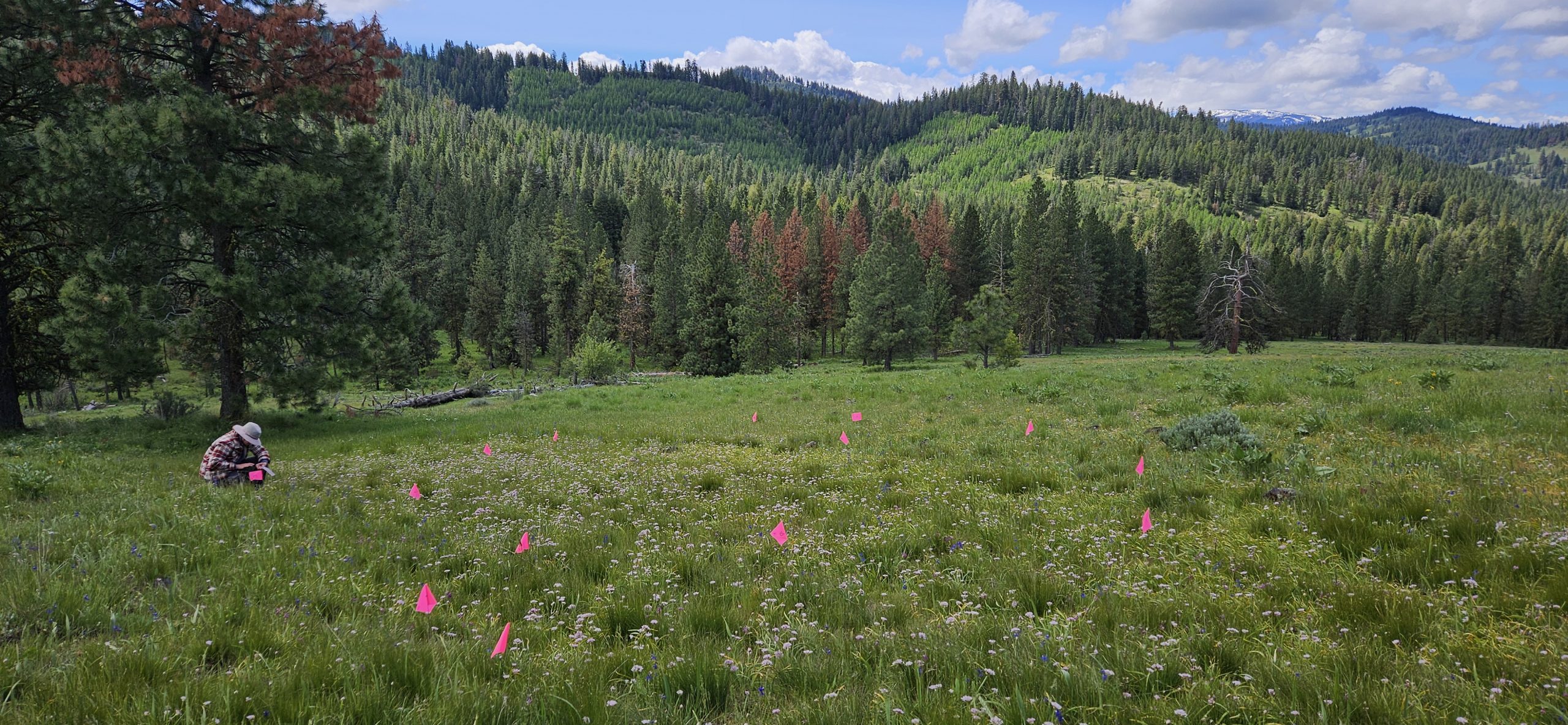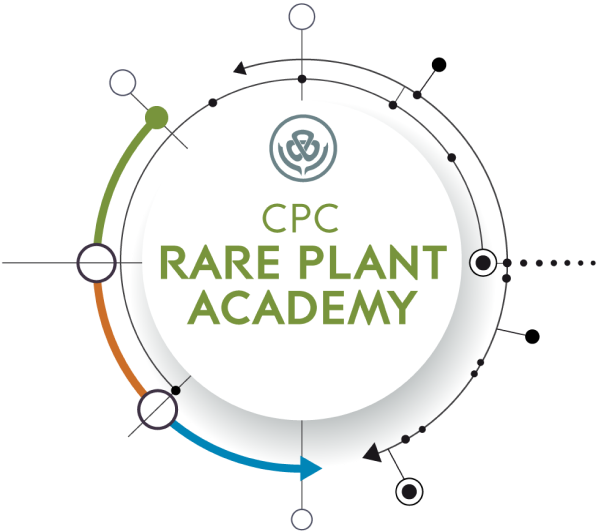Save Plants
Center for Plant Conservation
October News 2022
For many people, a love of plants blooms from early life experiences in nature or visits to a local botanic garden. It can grow with time, encouragement, and exposure—making public education and outreach a critical component of our work to Save Plants. CPC’s Conservation Partners are uniquely positioned to engage the public and foster an appreciation for and commitment to conserving rare and native plants through an array of innovative public programs. These programs forge connections between people and plants, enlist local communities as active partners and allies in conservation, and help spark career paths and lifelong support of plant conservation.
In this issue, Marie Selby Botanical Gardens highlights new educational outreach initiatives, centered on diversity and inclusion, that create more opportunities for their community members to visit the Garden and engage deeply with its operations and expertise. Our Conservation Champion, Amy Patten of the California Native Plant Society, shares how collaborating with community scientists, volunteers, and partner organizations can aid conservation efforts. As she says, “You don’t need to be a trained botanist or scientist to make meaningful contributions to conservation! Whatever your skills are … your help is needed.”
Public education and outreach can inspire and shape the next generation of plant conservationists, citizen scientists, volunteers, and supporters—which makes all the difference in our shared mission to Save Plants from extinction.
Thank you for being part of our conservation community,
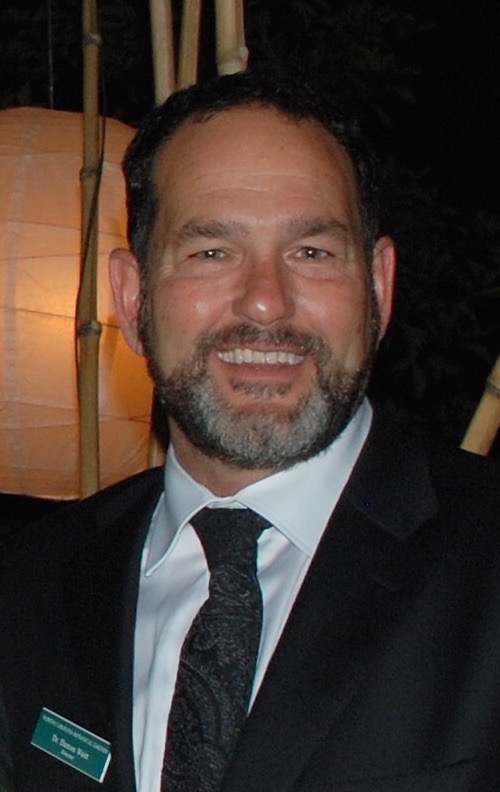
Damon Waitt
Director, North Carolina Botanical GardenMaking Our Garden Everyone’s Garden
Approaching its 50th anniversary, Marie Selby Botanical Gardens in Sarasota, Florida, is known for its botanical research and plant collections. Selby Gardens’ Downtown Sarasota campus is the only botanical garden in the world dedicated to the display and study of epiphytic plants, such as orchids, bromeliads, gesneriads, and ferns. Its Historic Spanish Point campus 10 miles south is one of the largest preserves in Florida showcasing native plants and active archaeology that is open to and interpreted for the public. Between the two sites, nearly 300,000 people visit annually.
Yet, the institution realized several years ago that not everyone in the region saw Selby Gardens as a place they might visit, let alone come to understand the significance of its research. In fact, some Sarasota residents who have lived close to the Gardens the longest have never seen this community treasure up close.
In 2019, the Gardens’ Board of Trustees created a Diversity and Inclusion Task Force to ensure that diversity and inclusive thinking would be front and center in everything the organization does. From employment and volunteering to exhibitions and membership, Selby Gardens has prioritized creating opportunities to be inclusive and open to all who wish to be there. “The ultimate goal is to ensure that all in our community see Selby Gardens as a place where they are welcome,” said President & CEO Jennifer O. Rominiecki.
For Selby Gardens’ Botany and Horticulture teams, one strategy to meet this goal is creating partnerships that attract underserved populations to careers in their disciplines and equip them for entry-level positions. Meanwhile, the Education staff is working to increase diversity among students and visitors and to provide instruction that resonates with people from various backgrounds. Working together, these teams have piloted exciting new opportunities for diverse groups to see the work of a public botanical garden up close—and see themselves potentially doing that work.
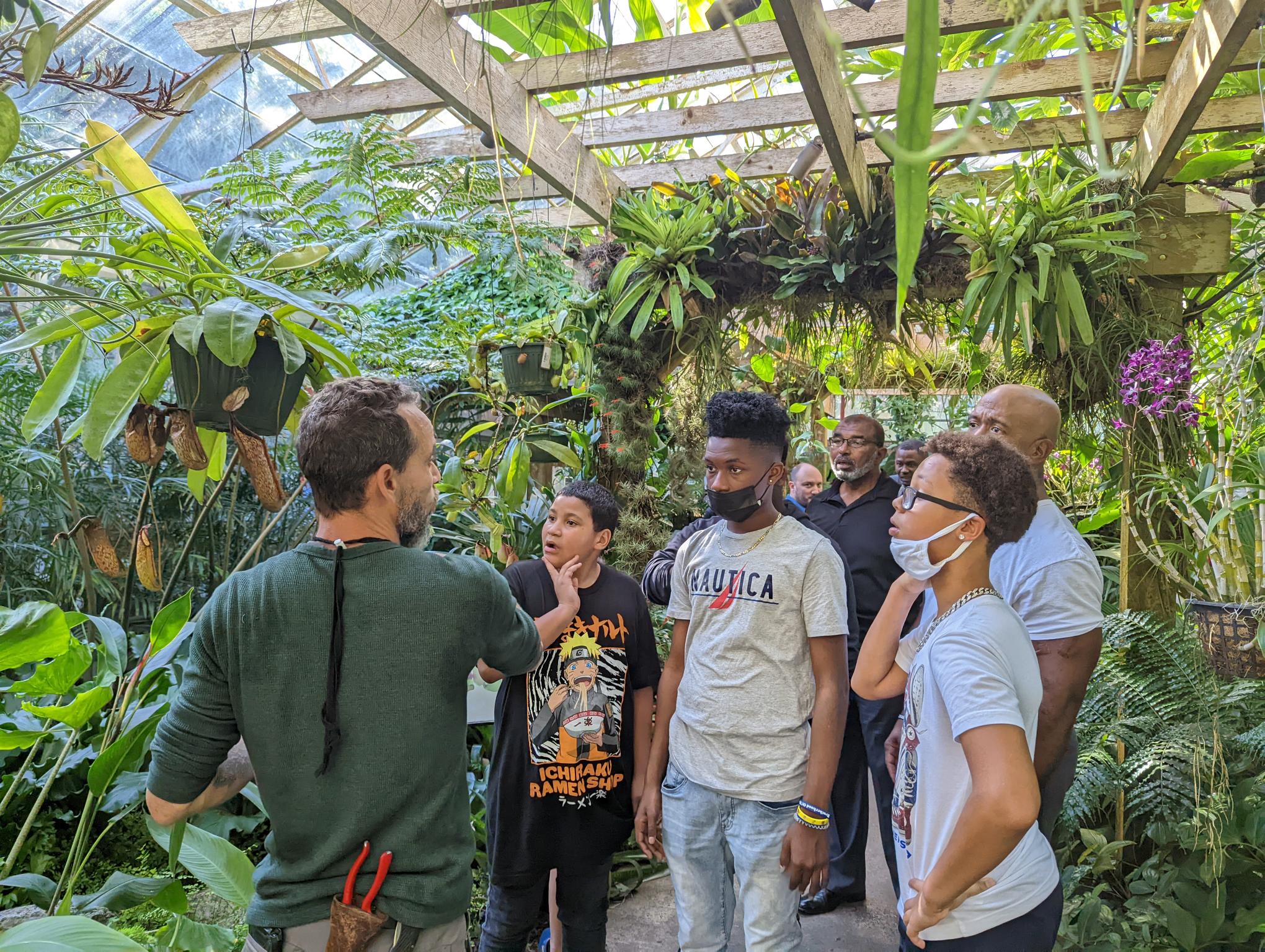
The internal collaboration builds on two early, foundation-funded programs designed to increase diversity in Selby Gardens’ visitorship. One works through local schools to invite underserved youth and their families to several family-friendly events at the Gardens (think July 4th fireworks, a holiday light show). A second program partners with local youth-serving organizations to offer free, renewable memberships to families who might not otherwise visit Selby Gardens.
The relationships that have developed with those organizations—tended by Selby Gardens’ new vice president for diversity and inclusion—are fertile ground for offshoots that can go much deeper than a few fun visits a year. “We call the free family membership program ‘My Garden,’ because we want everyone in our community to think of Selby Gardens as their garden,” says VP Walter Gilbert. “But we know that a visit to the Gardens may barely scratch the surface of all that goes on here.”
So, teaming with Vice President for Botany Bruce Holst and Director of Environmental Education Anastasia Sallen, Gilbert is expanding My Garden to engage different groups more deeply with the Gardens’ operations and expertise. While still nascent, this outreach is providing community members and Selby Gardens staff alike with uniquely rewarding experiences.
One example is the Brotherhood of Men Mentor Group, a nonprofit that fosters life skills and personal development in young, mostly Black males. Through My Garden, the group received a private tour with behind-the-scenes looks at Selby Gardens’ herbarium, spirit collection, DNA lab, and research greenhouses. Staff highlighted the range of STEM careers involved in each area the boys saw.
Next, staff demonstrated how their work can go beyond the Gardens proper, even right into the boys’ own neighborhoods. The students were invited to participate in a “BioBlitz” at Dr. Martin Luther King Jr. Memorial Park, a city park in Sarasota’s historic Newtown neighborhood. BioBlitzes are field excursions that contribute to the Sarasota-Manatee EcoFlora Project, which is managed by Selby Gardens. The EcoFlora Project—one of five around the country, built on the flagship project pioneered by the New York Botanical Garden—engages citizen scientists to observe, collect, and compile information on plants within their own community. The data can then be used to inform natural resource management and conservation.
“Selby Gardens has shown the boys living in the North Sarasota area, known as Newtown, a garden paradise they had no idea was right down the street from them,” said Dr. Dwight Fitch of the Brotherhood of Men. “Without the efforts and outreach of Selby Gardens, some of these young men may have never known about the history, the beauty, the legacy right in their community, or learned that they too can be a part of it.”
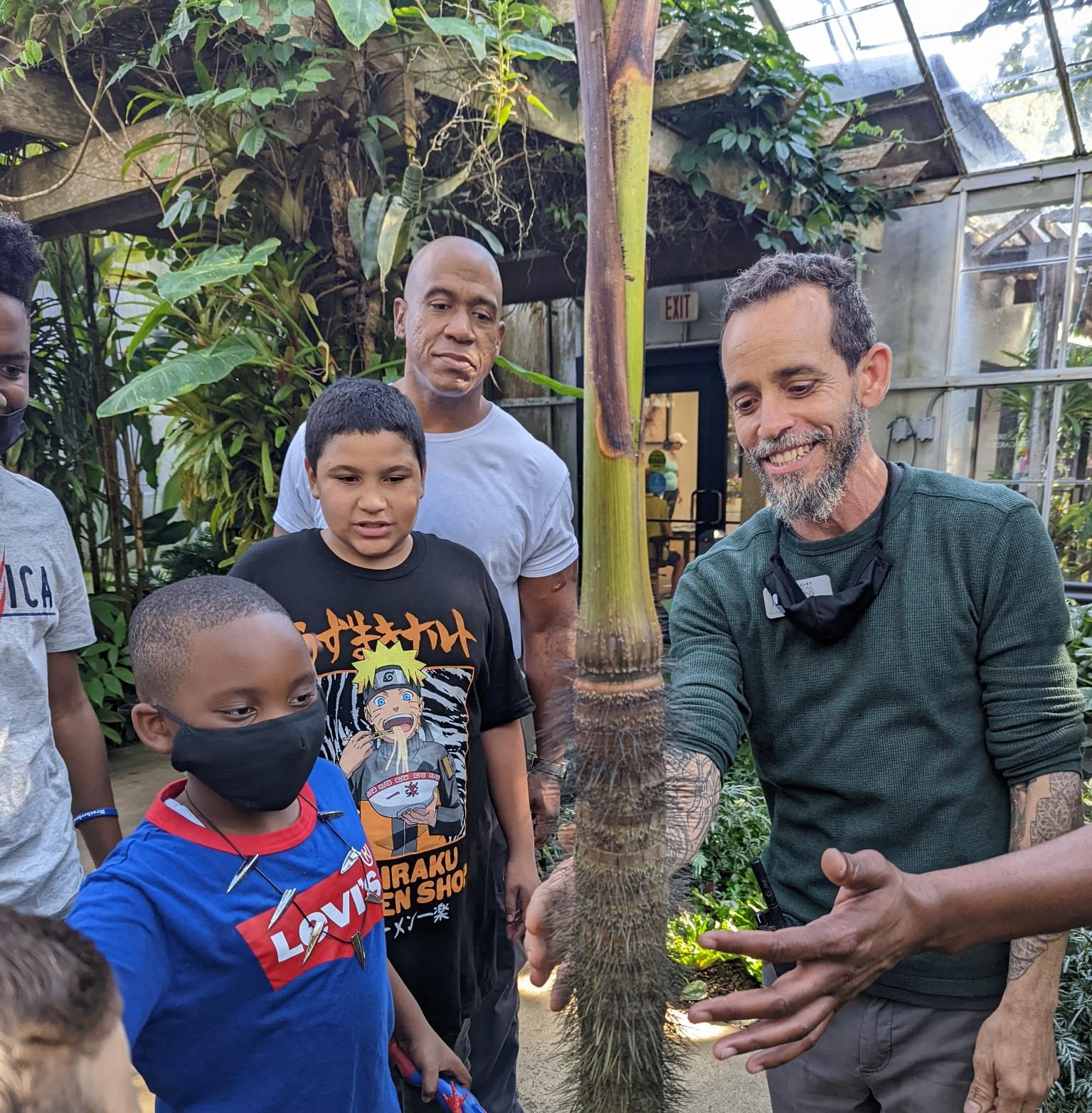
Selby Gardens already offers a variety of educational outreach programs, including field trips, virtual programs, and teacher guides for grades K – 12. Its research scientists also offer internship opportunities for students pursuing studies and careers in botany and horticulture. With the expanding My Garden program, it is adding a bridge between the two. While the effort is still young—more opportunistic experimentation than formalized program as of yet—Selby Gardens believes it can inspire and possibly help shape the next generation of plant conservationists.
-
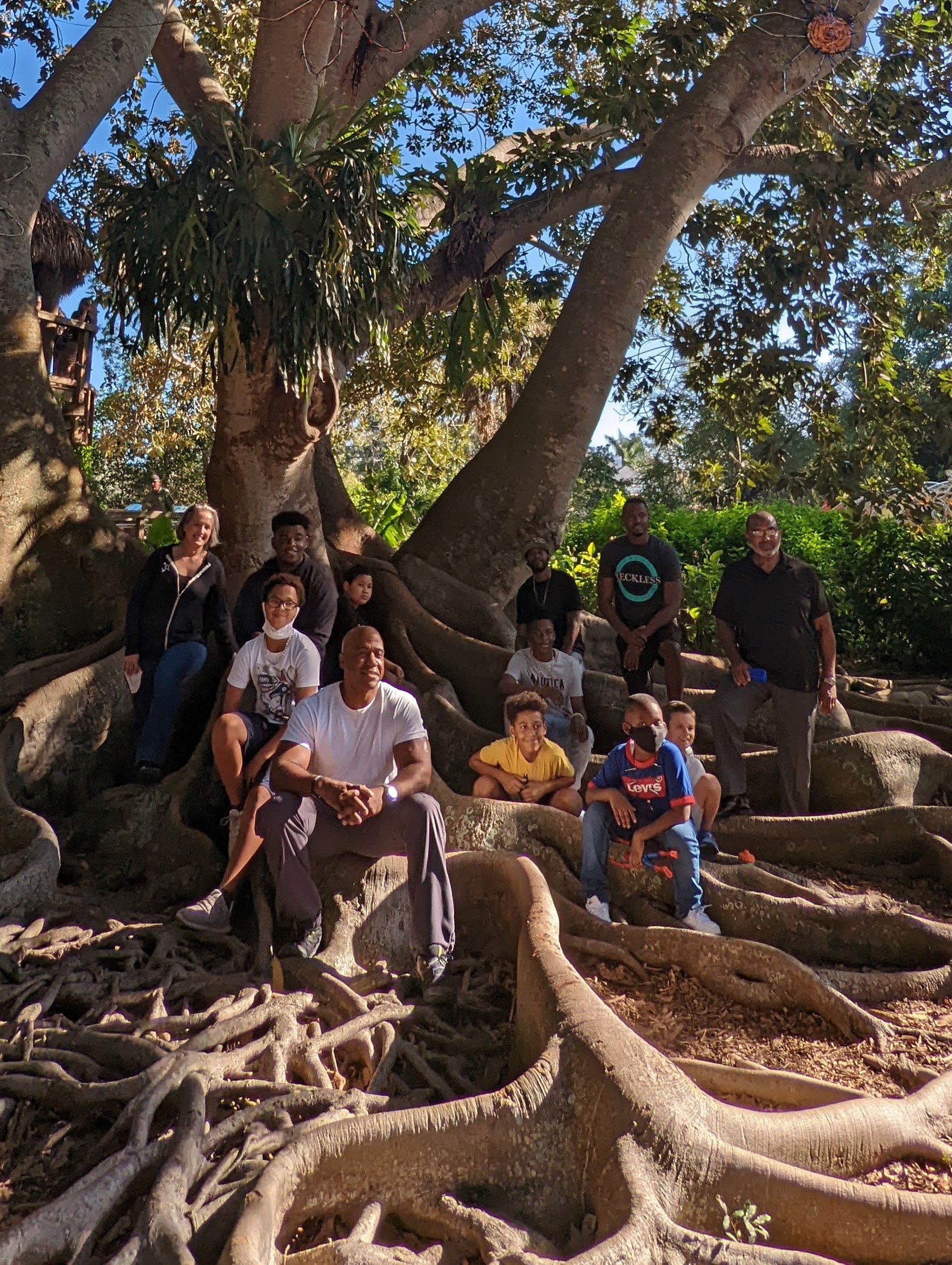
Brotherhood of Men students and mentors stop for a photo with Selby Gardens’ iconic Morton Bay Fig tree. Photo courtesy of Marie Selby Botanical Gardens. -
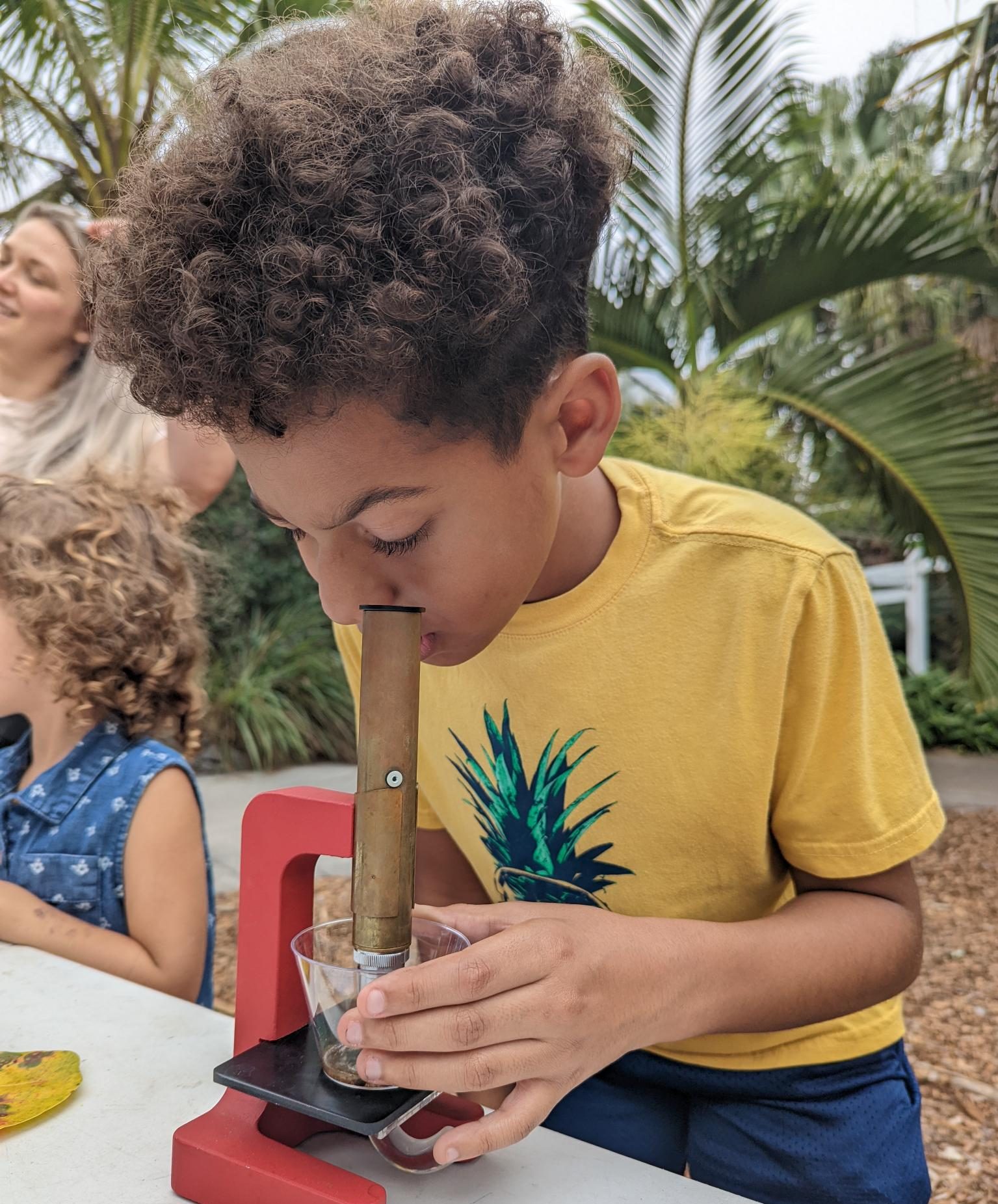
Youth get a hands-on introduction to plant science during a tour of Selby Gardens. Photo courtesy of Marie Selby Botanical Gardens. -

The Brotherhood of Men participates in a BioBlitz for the Sarasota-Manatee EcoFlora Project. Photo courtesy of Marie Selby Botanical Gardens.
Amy Patten
October’s Conservation Champion, Amy Patten, has a passion for science outreach and citizen science, which she channels into her role as Rare Plant Treasure Hunt Manager at the California Native Plant Society (CNPS). The Rare Plant Treasure Hunt is a citizen science effort which helps conserve rare plants by providing valuable data to the CNPS Rare Plant Program and the California Department of Fish and Wildlife. Since 2010, this project has served as an inspiring example of how botanical organizations can effectively collaborate with community members to advance and support rare plant conservation. Amy’s work shows the positive impacts that are made when we work together for our organizations and community, and for the rare and native plants we are striving to save.
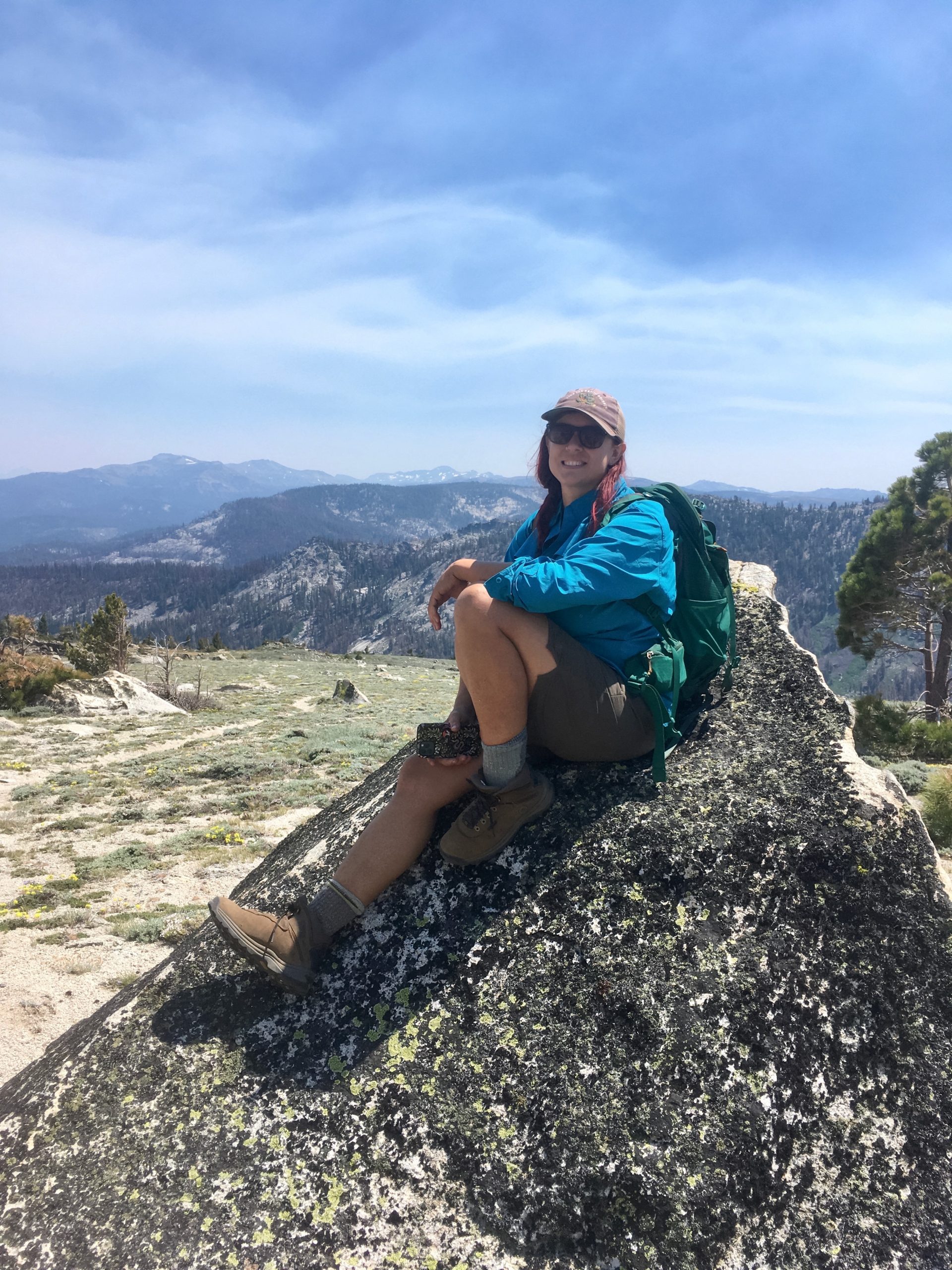
When did you first fall in love with plants?
As a child, I loved going to botanic gardens and reading books about plants. However, I mainly became interested in plants through a fascination with rare species. I’ve always been captivated by the factors that drive their distributions. I spend a lot of my free time outside of work doing things like trying to see rare birds, looking for new populations of rare salamanders, or photographing rare beetles. After college, I became interested in rare mariposa lilies (Calochortus spp.), which are astoundingly beautiful and have some really narrow endemics found in only one mountain range or even a single site. After a few adventures going to find and photograph them, I was hooked on plants!
What was your career path to California Native Plant Society (CNPS)?
I’ve spent most of my career working throughout California as a wildlife biologist, focusing on reptiles, amphibians, and birds. I started out as lab manager at UC Santa Cruz, where I assisted with research on behavior, genetics, and the effects of climate change on lizards. I had some amazing experiences working on crews surveying for rare and endangered fish, frogs, and toads. Later, I worked as a consultant doing surveys of breeding birds and amphibians. I gained a lot of experience surveying for hard-to-find species and started learning about plants while assessing wildlife habitats. Before I joined CNPS in 2018, I worked at a nonprofit where I managed volunteers, did fundraising, and put on bioblitzes. That experience provided the foundation for my community science work at CNPS.
In your experience, what are some of the pressing conservation needs impacting the rare and native plants of the United States?
Habitat destruction and fragmentation are huge issues. Saving places means saving plants! Many rare plants are specialists that require specific microhabitats, geology, or soil types, or are limited in their ability to disperse to new areas. If a population is destroyed or gene flow is cut off by development, those species have nowhere to go. Habitat loss also limits their resiliency to other major threats, such as invasive species, climate change, and drought.
How does your work on the CNPS Rare Plant Treasure Hunt program contribute to conservation needs in California?
We work with partner groups, agencies, and volunteers to look for new populations of rare plants, and to search for historic records of populations that haven’t been seen in many years and are in need of updates. Having current information on their status, distribution, and threats improves our ability to manage imperiled species. We put on public outreach events and talks to teach people about their local rare plants, and we provide free workshops and trainings on botany skills and surveying for rare plants. We also assist with efforts to make conservation seed bank collections as part of California Plant Rescue, a collaborative effort between institutions across the state to preserve the rare flora of California in seed banks and botanic gardens.
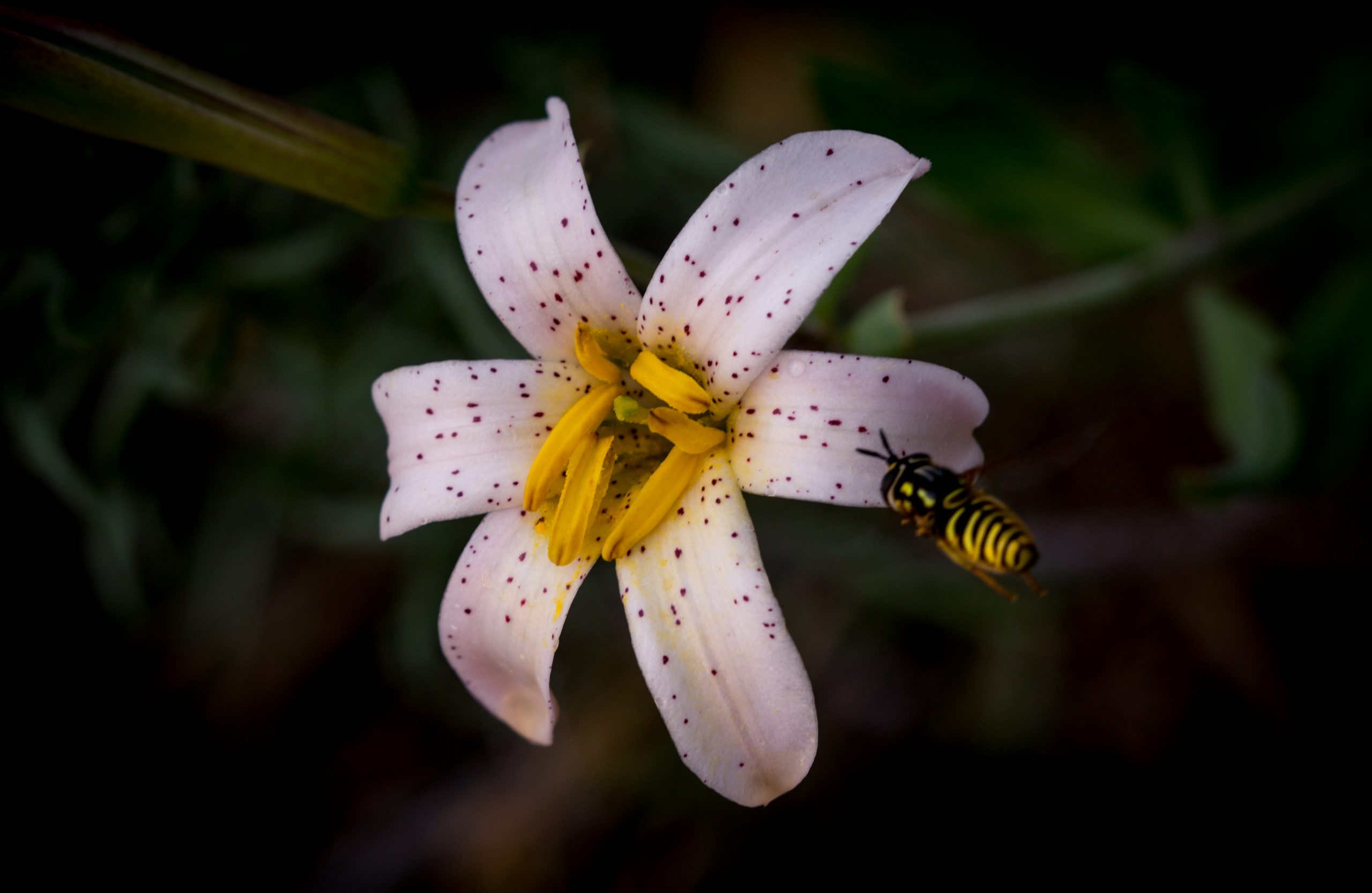
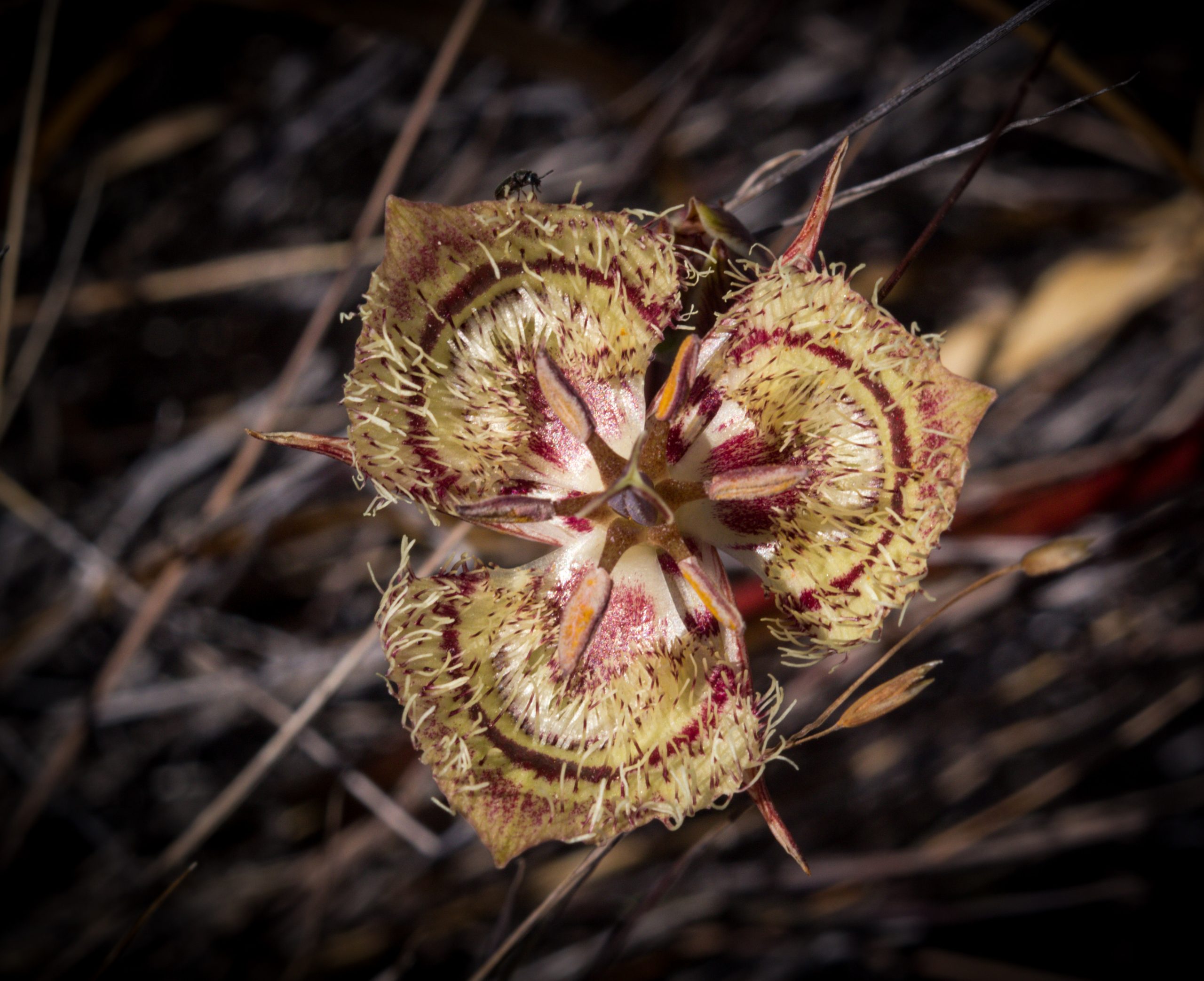
How can public engagement and outreach help achieve conservation goals?
The amount of data that scientists and land managers can collect on their own is limited by funding, staffing constraints, or geographic and political boundaries. It can also be difficult to set up and manage long-term studies, or to work on projects covering large areas. We have over 2500 rare plant taxa in California—conserving them all is a daunting task! Working with community scientists and building relationships with partner groups enables us to overcome some of these hurdles. Engaging with the public helps us to collect more data, learn about new populations of rare plants, and find out about conservation threats. Sometimes a rare plant population can quickly decline or become extirpated. We are able to detect threats and population trends faster with the help of volunteers and members of the public. This can be critical for assisting land managers or conservation advocates to intervene and prevent further impacts. Observations from volunteers and community science databases, such as iNaturalist, are also really helpful to monitor the phenology of our target species and pick the best timing to conduct surveys or collect seeds.
What has surprised you about working with and learning more about rare plants?
Rare plants can be really tenacious! It’s amazing what conditions they can overcome—and even thrive in. I love seeing rare plants in all sorts of weird places, like restaurant parking lots or the side of a major highway.
What advice would you give to those who wish to learn more about how they can help save imperiled plant species? How can the public learn more and get involved?
You don’t need to be a trained botanist or scientist to make meaningful contributions to conservation! Whatever your skills are—photography, building websites, fundraising, organizing events, doing stewardship work, or making observations—your help is needed. Look into volunteering at your local park or land trust that protects plant habitats, or with nonprofits (such as CNPS) that are focused on conserving species or places you’re interested in. There are also lots of great community science monitoring projects. Check out the iNaturalist website and search for projects in your area.
-
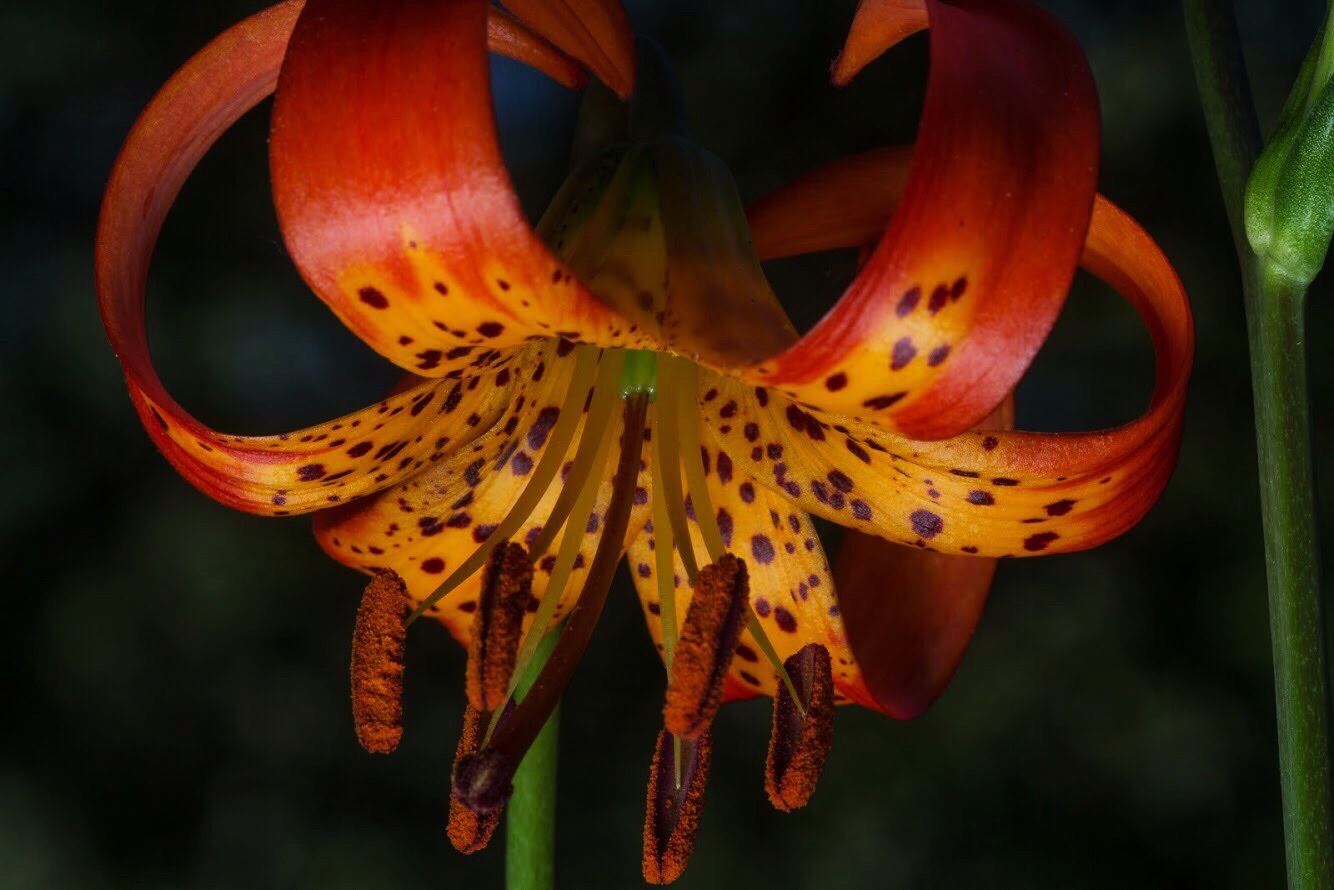
Pitkin marsh lily, Lilium pardalinum ssp. pitkinense, a state and federally endangered plant with only one confirmed extant population left. The other populations were lost to development and over collecting. Photo courtesy of Amy Patten. -
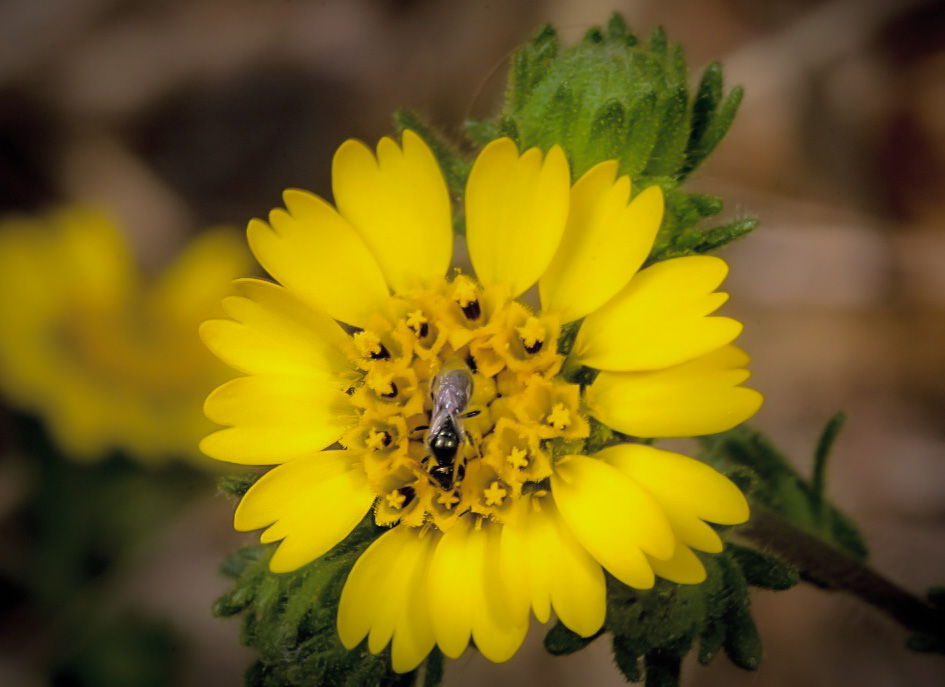
Santa Cruz tarplant (Holocarpha macradenia). One of Amy's favorite things about California is that with 2500 rare plants, no matter where you live, you’re likely not far from a rare plant population. Amy lives in the middle of a city but this endangered plant is in walking distance from her house. Photo courtesy of Amy Patten. -
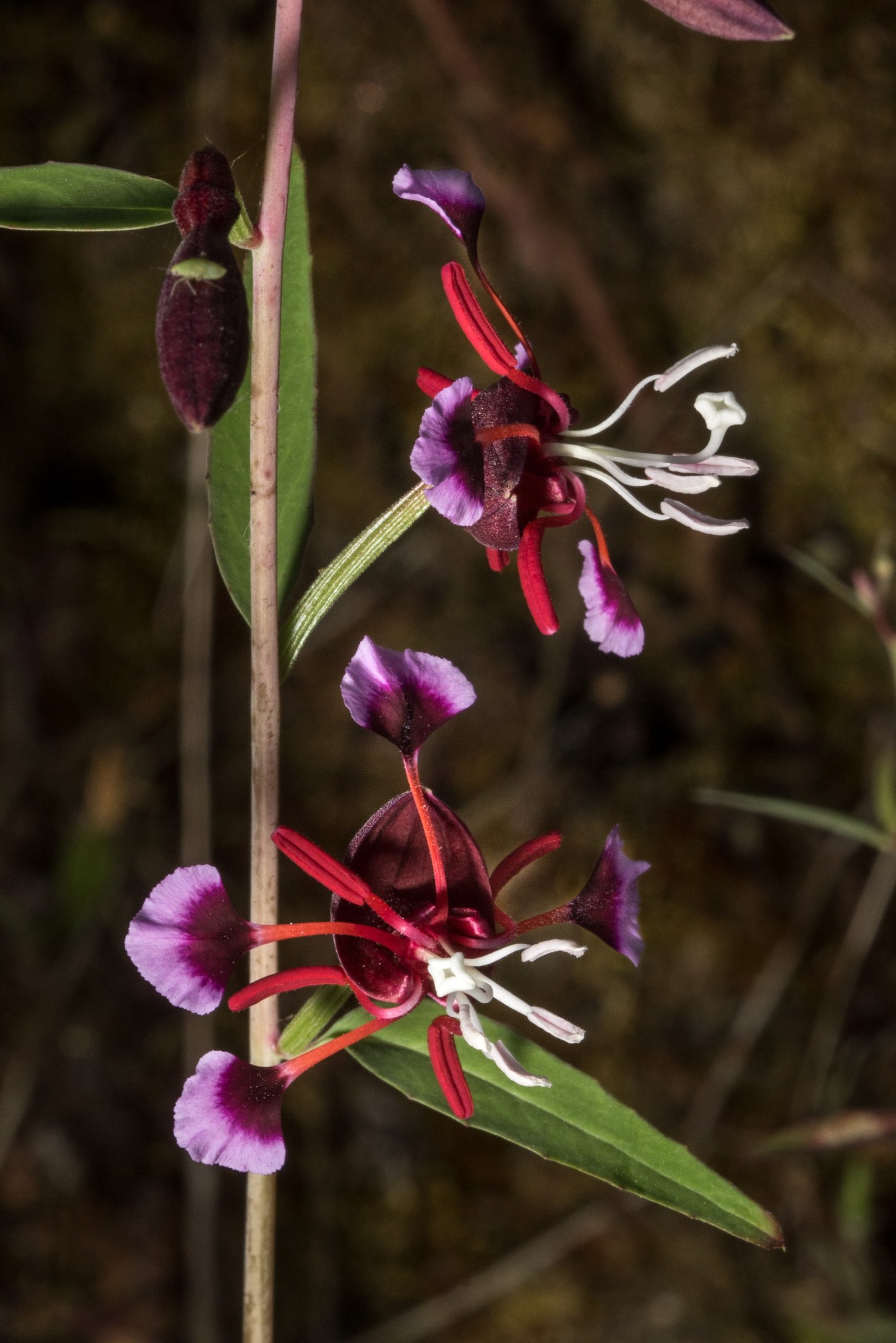
Springville clarkia (Clarkia springvillensis), is endemic to one county in the foothills of the Sierra Nevada range. Photo courtesy of Amy Patten.
Save the Date: 2023 National Meeting
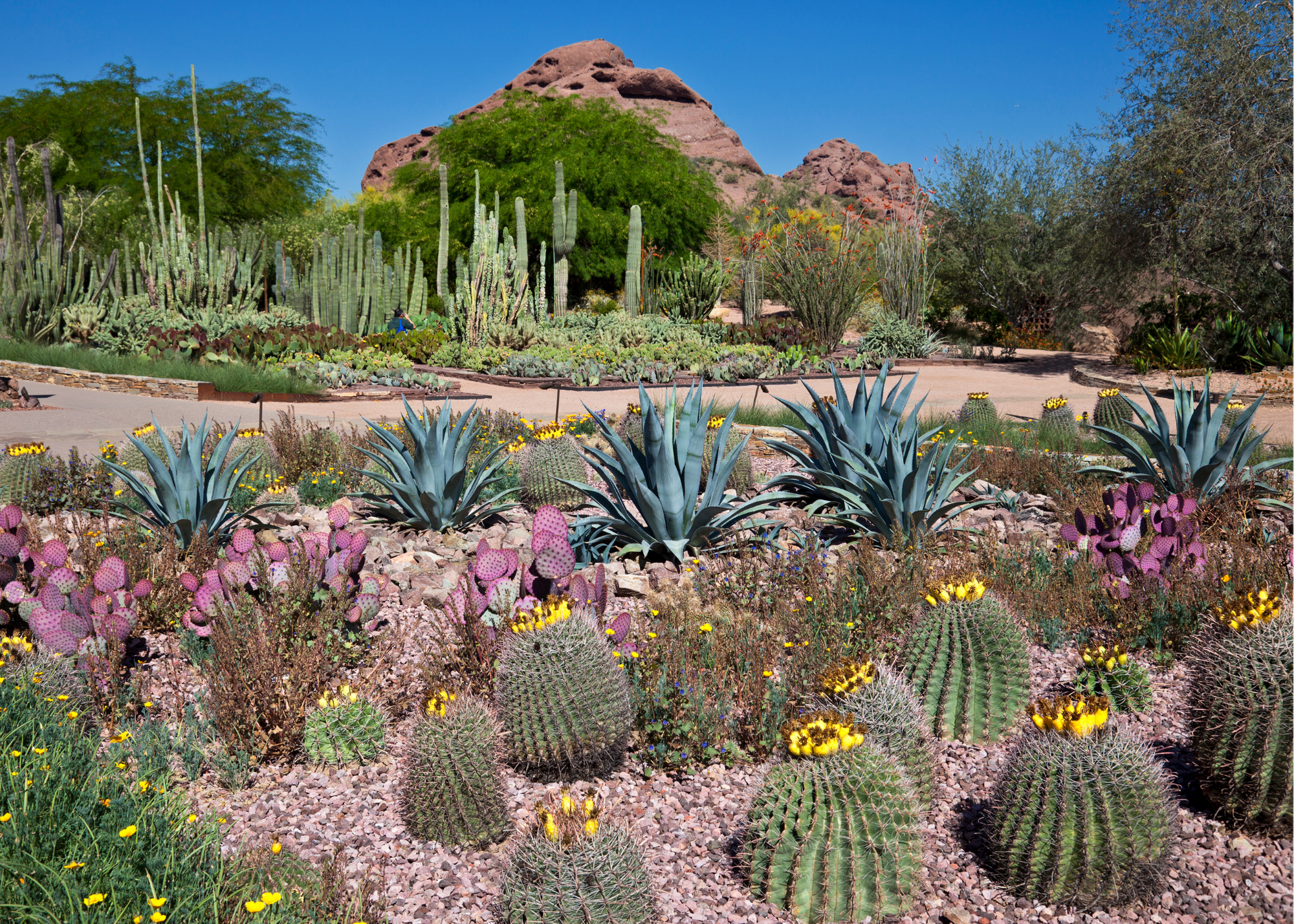
Mark your calendars – we are thrilled to announce that the 2023 CPC National Meeting will take place May 4-6! Back by popular demand, the 2023 meeting will feature a hybrid format, with both in-person and online presentation sessions highlighting the theme of “On the Horizon: Looking to the Future of Plant Conservation.” In-person sessions will be held at Desert Botanical Garden which offers 55 acres of gardens and trails for you to explore and immerse yourself in the beauty of the desert. In-person sessions will be live streamed and recorded for later viewing on the conference platform. Virtual attendees will also have access to pre-recorded presentation content and virtual breakout sessions.
Presentation sessions will include updates from the CPC National Office on network-wide initiatives, plus lightning talks from CPC network partners on plant conservation research, accomplishments and challenges, and future initiatives.
We welcome both Institutional and Individual Conservation Partners to submit abstracts for presentation sessions highlighting this year’s theme of “On the Horizon: Looking to the Future of Plant Conservation.” We encourage our contributors to consider presentation proposals that spotlight new conservation projects and research; ways your institution is visioning the field of plant conservation, goals, and outcomes in the future; or topics that otherwise adhere to the theme.
Visit our website for important dates and information for the 2023 National Meeting. Registration offerings and more details coming soon!
National Collection Spotlight: Troublesome Phacelia
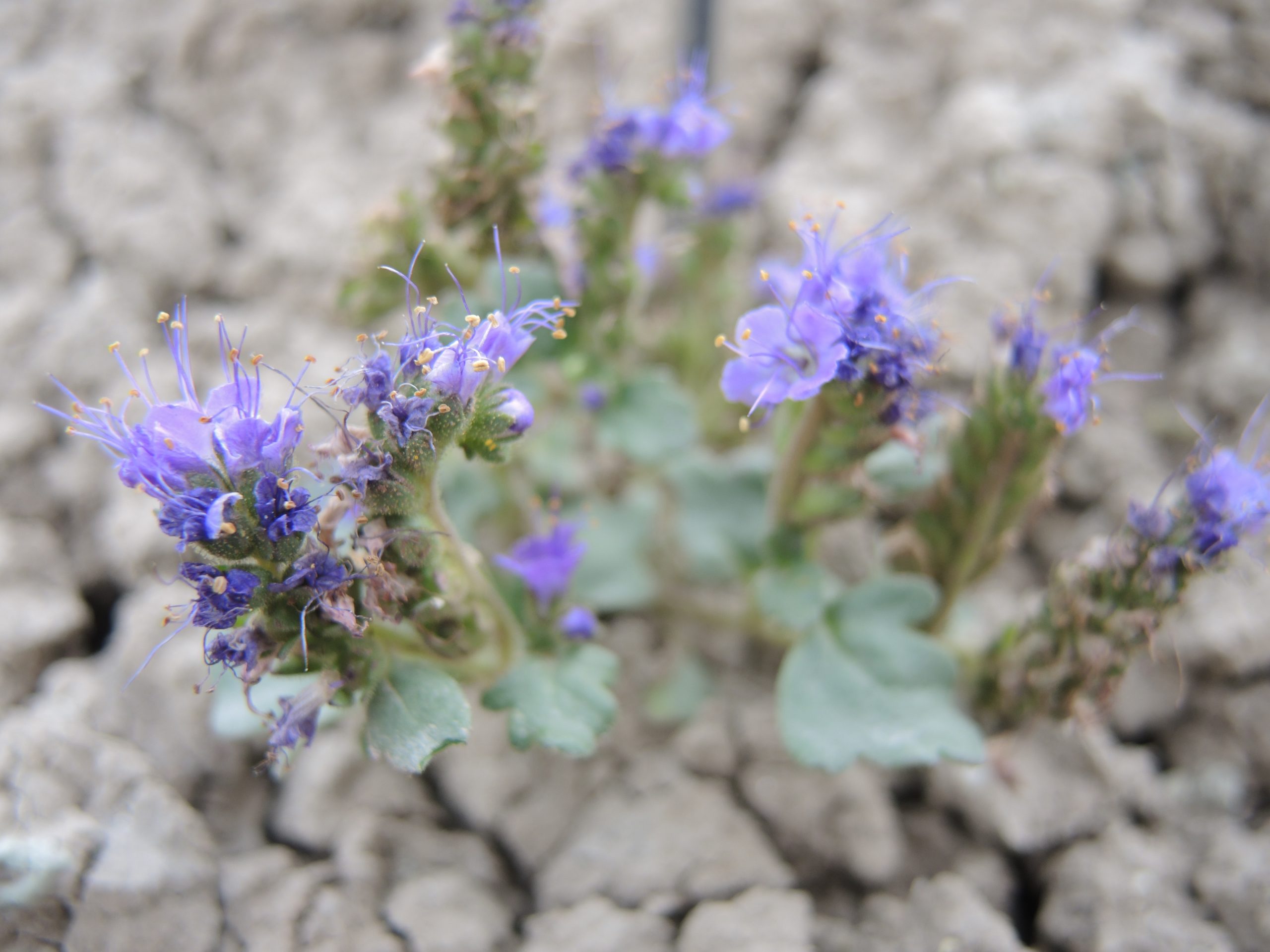
Troublesome phacelia (Phacelia gina-glenneae) is a critically imperiled species which grows on tan-colored shale/clay substrates in Colorado. Described for the first time in 2013, the species is known from only one population in Grand County, Colorado. This plant earned its common name from its proximity to Troublesome Creek, and it flaunts lovely clusters of purple flowers.
Phacelia gina-glenneae is held in the CPC National Collection at Denver Botanic Gardens, where genetic analyses of the species were conducted to quantify its genetic diversity and confirm its separation from similar species in the genus. Seed collected from this species in 2017 is stored at Denver Botanic Gardens as well as the USDA-ARS National Laboratory for Genetic Resources Preservation.
Learn more about conservation actions taken for Troublesome phacelia on its National Collection Plant Profile, and help support its conservation with a Plant Sponsorship.
As Seen on CPC’s Rare Plant Academy: Capturing the Latest Conservation Science
The Rare Plant Academy Video Library hosts a wealth of knowledge in plant conservation and research. In addition to instructional videos on conservation methods, recordings of recent conferences can be found in the Video Library. This includes the CPC 2022 National Meeting, the Global Conservation Consortium for Oaks – California + Channel Islands 2021 Meeting, and the 2020 Southeast Plant Conservation Conference. Users can explore the Video Library and view presentations from these recent conferences and several others, gaining access to cutting-edge research and discussions. These conference recordings represent an abundance of knowledge from leading professionals and institutions, capturing the latest conservation science in a powerful resource on the Rare Plant Academy.
Get Updates
Get the latest news and conservation highlights from the CPC network by signing up for our newsletters.
Sign Up Today!Employment Opportunities
Title: Conservation Genomics
About us: The Chicago Botanic Garden’s Negaunee Institute for Plant Conservation Science and Action is a global leader in plant-based research, education, and engagement to sustain and enrich life. Based in the Chicago metropolitan area, one of the largest, and most racially diverse cities in North America, the Garden opened 50 years ago as a beautiful place to visit, and it has matured into one of the world’s great living museums and conservation science centers. The Garden’s mission is grounded in the belief that caring for gardens and natural areas is fundamentally important to the well-being of everyone. The Garden strives to make its campuses and all its programs available and accessible to people of all ages, backgrounds and abilities. We value diversity in all its forms and at every level of our organization – board, staff, volunteers, and vendors. Through the diversity of backgrounds, perspectives and experiences, the Garden is more effectively able to create extraordinary and welcoming experiences for our increasingly diverse audiences. We are committed to ensuring a sense of belonging to every individual we encounter, regardless of age, race, gender, ethnicity, religion, sexual orientation, physical ability, intellectual ability, or economic status.
Position Overview: We seek to hire an assistant scientist to join the Garden’s Negaunee Institute for Plant Conservation Science and Action (https://www.chicagobotanic.org/research). We are seeking a full-time, career-track scientist who uses genomics and bioinformatics tools to answer questions relevant to conservation and/or restoration. Research interests in any area of genomics, including but not limited to biogeography, community genomics, environmental genomics, evolution, fungal/microbial genomics, phylogenomics or systematics. The successful candidate will join a highly collaborative group of scientists focused on addressing key conservation challenges. In addition to conducting research, the successful candidate will serve as faculty in our joint Plant Biology and Conservation graduate program with Northwestern University and will be expected to mentor, assist and train students in using genomic and bioinformatic tools. All scientists at the Garden are expected to assist with education programs including internship programs, community engagement and service activities where appropriate.
The preferred start date is early 2023 but can be flexible.
Responsibilities:
- RESEARCH: (Estimated time commitment: ~40%)
- Conduct genomic and bioinformatic research that has conservation or restoration implications.
- Obtain external funding to support their research programs.
- Disseminate results through scientific publications and presentations as well as broader communication venues that target groups such as policy makers, land managers, and the public.
- EDUCATION: (Estimated time commitment: ~30%)
- Mentor students from diverse backgrounds at a variety of academic levels.
- This will include serving as an advisor or committee member for
- Graduate students in the Garden’s Plant Biology and Conservation program with Northwestern University (https://www.plantbiology.northwestern.edu/),
- Undergraduate students from Northwestern University and our NSF-REU Site program (https://pbcinternships.org/) over the summer.
- High School students in the College First program (https://www.chicagobotanic.org/collegefirst)
- Participation in team-teaching a Northwestern University introductory graduate course in field and lab methods (2-3 class sessions in fall); teaching an upper-level undergraduate or graduate level course in the candidate’s area of expertise is encouraged (each class is 9 weeks).
- INSTITUTIONAL SERVICE: (Estimated time commitment: ~20%)
- Assist in the management of the departmental bioinformatics server
- Contribute to Garden and departmental initiatives. These include
- Provide genomic and bioinformatic support to staff and students for research and applied projects at the Garden.
- As a public-facing institution, scientists are expected to participate in science interpretation efforts or other Garden initiatives depending on the candidate’s interest and skills. This can include various activities, including assistance with the interpretation of displays, science festivals, and/or program development.
- Work collaboratively with department faculty, and other Garden departments (Learning and Engagement, Horticulture, Collections, Communications, and Visitor Services).
- COMMUNITY ENGAGEMENT: (Estimated time commitment: ~10%)
- Contribute to the department’s education, engagement, and/or community science activities.
- Help synthesize research, communicate science, and/or develop policy and conservation practice.
- Develop collaborations with conservation institutions and agencies.
Qualifications and Desirable traits: PhD or equivalent, in biology, ecology, evolution, botany, environmental science, mycology, or related area. We seek a candidate with strong genomics and bioinformatics skills with experience in generating, managing and analyzing genomics data, synthesizing large datasets, and versed in a wide range of statistical approaches. As one strength of this institution is the collaborative environment which allows us to take an interdisciplinary approach to applied conservation issues, we seek a candidate who has a record of engaging in a collaborative approach to their research program. As a scientist based at a public-facing institution, in addition to competency in publishing their research in scientific journals, we value experience in engaging scientific discourse that is accessible to the general public. Excellent communication skills. Interest and commitment to seeing research results applied to conservation or restoration. Commitment to fostering a diverse, equitable, and inclusive environment. Teaching, mentoring, and project/grant management experience desired. We highly value people who are enthusiastic about science communication, cultural competency, and building/maintaining community partnerships.
To Apply: Please go to https://tinyurl.com/AssistConservationSciGenomics to apply. In addition to the Garden application materials, please submit 1) a cover letter; 2) curriculum vitae; 3) a statement on current and proposed future research interests, which should include a statement on conservation or restoration implications of your research (1-2 pgs); 4) a representative publication; 5) mentoring and teaching experience and philosophy (max 1 pg); 6) statement on how you can contribute to the Garden’s diversity, equity, inclusion and accessibility goals (max 1 pg); and 7) contact information for three references. The review of applications begins October 1, 2022, and will continue until a suitable candidate is hired. Contact Jeremie Fant at jfant@chicagobotanic.org with any questions.
We are an Equal Opportunity Employer and do not discriminate against any employee or applicant for employment because of race, color, sex, age, national origin, religion, sexual orientation, gender identity, status as a veteran, and basis of disability or any other federal, state or local protected class.
In accordance with Title IX of the Education Amendments Act of 1972, Chicago Botanic Garden does not discriminate on the basis of sex in its programs or activities, including in employment or admissions. Please call (847) 835-8264 to contact our Title IX Coordinator should you have questions or concerns.
Plant science. Grow knowledge. Sustain life.
Title: Conservation Scientist
About us: The Chicago Botanic Garden’s Negaunee Institute for Plant Conservation Science and Action is a global leader in plant-based research, education, and engagement to sustain and enrich life. The Institute is housed within the 38,000 square foot Plant Conservation Science Center on our Glencoe, Illinois campus. Our building has eight shared, function-based labs and currently hosts 27 science staff and more than 40 graduate students through a graduate program in Plant Biology and Conservation (offered jointly with Northwestern University). The Garden’s natural areas serve as a living laboratory for our work, and scientists have access to 75,000 sq. ft. of production greenhouse space and technical assistance from CBG’s experienced horticultural staff to assist with propagation and production of plants for research. The Garden also supports several unique programs including two community science initiatives – Budburst and Plants of Concern, a synthesis Center for Conservation and Restoration (sCORE), a Research Experiences for Undergraduates (REU) site program, as well as a Conservation and Land Management Internship Program. Our research, conservation, and training activities meet the needs of local, regional, and national conservation institutions, governmental agencies, and schools of higher education.
Based in the Chicago metropolitan area, one of the largest and most racially diverse cities in North America, the Garden opened 50 years ago as a beautiful place to visit, and it has matured into one of the world’s great living museums and conservation science centers. The Garden’s mission is grounded in the belief that caring for gardens and natural areas is fundamentally important to the well-being of everyone. The Garden strives to make its campuses and all its programs available and accessible to people of all ages, backgrounds and abilities. We value diversity in all its forms and at every level of our organization – board, staff, volunteers, and vendors. Through the diversity of backgrounds, perspectives and experiences, the Garden is more effectively able to create extraordinary and welcoming experiences for our increasingly diverse audiences. We are committed to ensuring a sense of belonging to every individual we encounter, regardless of age, race, gender, ethnicity, religion, sexual orientation, physical ability, intellectual ability, or economic status.
Position Overview: We seek to hire a conservation scientist at the assistant scientist rank to join the Garden’s Negaunee Institute for Plant Conservation Science and Action The Garden is currently developing several initiatives to promote equity, diversity, inclusion, and accessibility in science and conservation. You can read more on these initiatives and the Garden’s commitment to EDIA here. This is a full-time, career-track position. We seek applicants who address questions that support conservation and/or restoration actions in areas including, but not limited to, urban ecology, invasive species ecology, ecophysiology, quantitative ecology, restoration ecology, soil/fungal/microbial ecology, or human dimensions of the environment. The successful candidate will join a highly collaborative group of scientists focused on addressing key conservation and restoration challenges. In addition to conducting research, the successful candidate will serve as faculty in our joint Plant Biology and Conservation graduate program with Northwestern University. All scientists participate in education programs as well as community and Garden-wide engagement activities. Start date is flexible with a preference for early 2023.
Responsibilities:
1. RESEARCH: (Estimated time commitment: ~40%)
• Conduct research that clearly supports conservation or restoration.
• Obtain external funding to support a research program.
• Share results through scientific publications and presentations as well as broader communication venues that engage groups such as policy makers, land managers, and the public.
2. EDUCATION: (Estimated time commitment: ~30%)
• Mentor students from diverse backgrounds at a variety of academic levels. This will include serving as an advisor or committee member for:
o Graduate students in the Garden’s Plant Biology and Conservation program with Northwestern University (https://www.plantbiology.northwestern.edu/),
o Undergraduate students from Northwestern University and our NSF-REU Site program (https://pbcinternships.org/) over the summer.
o High School students in the College First program (https://www.chicagobotanic.org/collegefirst )
• Participation in team-teaching a Northwestern University introductory graduate course in field and lab methods (2-3 class sessions in fall) or teaching an upper-level undergraduate or graduate level course in the candidate’s area of expertise is encouraged but not required (quarter system; each class is 9 weeks).
3. INSTITUTIONAL ENGAGEMENT: (Estimated time commitment: ~20%)
• Actively participate in Garden and departmental initiatives.
o Work on synthesis projects within our synthesis Center in Conservation and Restoration. o Work collaboratively with natural areas ecologists and interns at the Garden and regionally to inform stewardship, conservation, and restoration.
o Work collaboratively with other Garden departments (Learning and Engagement, Horticulture, Collections, Communications, and Visitor Services) on projects that support the Garden’s mission and strategic plan.
o Participate in science interpretation efforts, including assistance with displays, science festivals, and/or interpretive program development.
o Contribute to departmental and Garden-wide strategic planning, project development, and related tasks.
4. COMMUNITY ENGAGEMENT: (Estimated time commitment: ~10%)
• Contribute the Garden’s education, engagement, and/or community science activities.
• Help synthesize research, communicate science, and/or develop policy to support conservation or restoration practice.
• Participate in the Garden’s advocacy work.
• Develop and/or help grow and maintain collaborations with partner organizations, including conservation organizations, agencies, and/or community groups.
Qualifications and Desirable traits: Ph.D. in biology, ecology, botany, environmental studies, social science, or related area. A key strength of the Garden is a collaborative environment which allows us to take an interdisciplinary approach to applied conservation/restoration issues, so we seek a candidate who will use a collaborative approach to building a research program that actively engages with internal and external partners to support conservation/restoration. We seek a candidate with strong quantitative skills and experience utilizing and mentoring others in relevant statistical approaches.
Candidate’s research program should allow them to be in Chicago for most of the summer to mentor students.
We value individuals with a desire to build/maintain research with local or regional partners in the Great Lakes regions as part of their research portfolio. As scientists based at a public-facing institution, in addition to competency in publishing research in scientific journals, we value experience in and support the maintenance of meaningful partnerships with diverse groups as well as scientific discourse that is accessible to the general public. We highly value people who are enthusiastic about science communication and dedicated to increasing equity, diversity, inclusion, and accessibility in the environmental field.
To Apply: Please go to https://tinyurl.com/AssistConservationSciRS to apply. In addition to the Garden application materials and in lieu of a cover letter, please submit: (1) curriculum vitae; (2) statement on current and proposed future research interests that complements our current expertise and programs (e.g., Plants of Concern, Budburst, sCORE) (1-2pgs); (3) statement on how your current and proposed research will support conservation or restoration, including examples of how you have or will work with internal or external partners to design, implement, and apply results (max 1 page); (4) mentoring and teaching experience and philosophy (max 1 page); (5) statement on how you can contribute to the Garden’s diversity, equity, inclusion and accessibility goals (max 1 pg); and (6) contact information for three references. Review of applications begins October 7, 2022 and will continue until a suitable candidate is hired. Contact Andrea Kramer at akramer@chicagobotanic.org with any questions.
We are an Equal Opportunity Employer and do not discriminate against any employee or applicant for employment because of race, color, sex, age, national origin, religion, sexual orientation, gender identity, status as a veteran, and basis of disability or any other federal, state or local protected class.
In accordance with Title IX of the Education Amendments Act of 1972, Chicago Botanic Garden does not discriminate on the basis of sex in its programs or activities, including in employment or admissions. Please call (847) 835-8264 to contact our Title IX Coordinator should you have questions or concerns.
Plant science. Grow knowledge. Sustain life.
Ways to Help CPC

Conservation Advocacy Initiatives
Advocacy is an important tool at our disposal to use in saving rare and endangered plants. In the broadest sense of the word, advocacy means to share and communicate the mission of our organization. When we all join together, we can be a voice for rare plants.
In August 2022, President Joe Biden signed the Inflation Reduction Act of 2022 into law. Dubbed the “Climate Bill,” this new law, in part, makes historic climate investment to reduce carbon emissions by roughly 40% by 2030 and to protect nearly 2 million acres of national forests. This will help combat the major threat climate change poses to endangered plants.
Now we need your help to support S. 2372 – Recovering America’s Wildlife Act (RAWA). Passed by the House of Representatives in a 231-190 bipartisan vote on June 14, 2022, this legislation will now move to the Senate for consideration.
ACT NOW to let your Senators know that you support “RAWA” and hope they will vote “yes” when S. 2372 comes to the floor for a vote. Contact your representativesor call the Capitol switchboard in D.C. on (202) 224- 3121 and ask to be connected to your Senator’s office, where you’ll be able to speak to a member of their staff.

Support CPC By Using AmazonSmile
As many of us increasingly rely on home delivery, we want to remind you that you can keep your home stocked AND Save Plants. If you plan to shop online, please consider using AmazonSmile.
AmazonSmile offers all of the same items, prices, and benefits of its sister website, Amazon.com, but with one distinct difference. When you shop on AmazonSmile, the AmazonSmile Foundation contributes 0.05 percent of eligible purchases to the charity of your choice (Center for Plant Conservation).
There is no cost to charities or customers, and 100 percent of the donation generated from eligible purchases goes to the charity of your choice.
AmazonSmile is very simple to use—all you need is an Amazon account. On your first visit to the AmazonSmile site, you will be asked to log in to your Amazon account with existing username and password (you do not need a separate account for AmazonSmile). You will then be prompted to choose a charity to support. During future visits to the site, AmazonSmile will remember your charity and apply eligible purchases towards your total contribution—it is that easy!
If you do not have an Amazon account, you can create one on AmazonSmile.
Once you have selected Center for Plant Conservation as your charity, you are ready to start shopping. However, you must be logged into smile.amazon.com—donations will not be applied to purchases made on the Amazon.com main site or mobile app. It is also important to remember that not everything qualifies for AmazonSmile contributions.
When ordering online, remember you can still help Save Plants. Please feel free to share this email with your friends and family and ask them to select Center for Plant Conservation.
Thank you all for ALL you do.
Donate to CPC
Thank you for helping us save plant species facing extinction by making your gift to CPC through our secure donation portal!
Donate Today